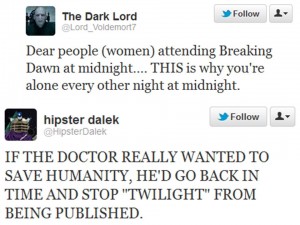Though theoretically this blog is a place to preview things I’m working on, it hasn’t ever been so far. However, in a week when no current events or pop culture topics stand out to me (though as Bradley Manning’s Gender Identity Disorder defense broke this morning, too late to blog, I was nevertheless tempted), and I’m going to be traveling on Blog Thursday anyway, I thought I’d give it a go.
I’ve recently finished reading two very smart dissertations, Julie Levin Russo‘s Indiscrete Media: Television/Digital Convergence and Economies of Online Lesbian Fan Communities and Suzanne Scott‘s Revenge of the Fanboy: Convergence Culture and the Politics of Incorporation.
These are scholars I personally know and respect and thinkers after my own heart. So much after my own heart, in fact, that my reading of their dissertations was punctuated by bouts of fear that one or the other of them—or both!—had already written what I wanted to say in mine.
Both are interested in the interface of fandom and industry, like me. They are wary, rather than uncritically enthusiastic, about the impact of digital technology, like me. They are concerned about the role of capital in contemporary fandom, especially as labor—like me. Among the objects in all three dissertations is Battlestar Galactica’s website and video maker. That’s a lot in common.
And, I suppose I could look at it as: If three dissertations, produced across the country (East Coast, West Coast, Midwest), with no more than minimal collegial interaction (like, I had already planned to look at certain issues before I got around to doing this reading, and we haven’t really discussed it—maybe Julie and Suzanne were in closer touch), are doing this work, then maybe that means it’s just time for these questions to be asked.
But I don’t entirely have the luxury of just celebrating the fact that other people have noticed the things I care about. The scholarly project, as currently defined in the U.S. anyway, is to produce something new, that no one has said, and differentiate it from what people have said before. For my dissertation to be seen as valid, then, it has to be different from Julie and Suzanne, so when those moments of “OMG, she wrote my dissertation!” came over me, I would take a moment to figure out how I differed.
Here’s what I came up with.
I am, first, way more of a Foucaultian than either of them. What I find interesting about contemporary practices of “embracing” fandom (or, at least, how I frame it) is the way that the waning of repressive power—saying “no” through cease-and-desists, say—looks like no power at all. But of course it still is power. It’s just productive power—inciting and normalizing certain behaviors and practices, and in so doing producing fandom.
To those whose behavior is incited and within the norm, it looks like a free-for-all, but at the margins—often produced through gender (Scott) and sexuality (Russo)—the seams show. We scholars can see around the edges, then (and so can some fans, to provisionally accept a standpoint, “the oppressed can see the system better” argument that I’m not sure I totally buy).
Recognizing, then, that what’s in that middle, normative space is constructed and partial and benefits industry/capital way more than fans, if the cultural status of fandom has shifted in the internet era, what is it now? How does mainstream American culture make sense of this concept “fan”?
When we see fans on our television or cinema screens, who are they and what do they do? If they’re no longer automatically murderers (which I’ll be the first to admit is an improvement), that doesn’t mean that what they are now doesn’t matter—so what’s the meaning of this concept that we see representationally constructed?
When industry extends a hand to fans, who do they reach out to? What do they invite them to do? What do they think a fan is? And, with the much-vaunted capacity of the internet to make things possible, what actually becomes a possibility? When industry invites fans to come play, what does that consist of? What do official websites afford or not afford, and how is that implicitly an argument about who fans are and what they do?
Rather than looking at specific texts or cultures of fandom, as Russo and Scott do (exceedingly well), my aim is to assess the cultural field of meaning surrounding the idea “fan” by tracing how it gets deployed across the mediascape in fictional and nonfictional representation and by industry in web design and their own conceptualization of the term.
And rather than asking how industry practice matches up (or doesn’t) to existing fandoms, I turn the question a different direction: With this productive power, what is “fan” being produced as?
And that seems different enough, and to produce enough of a different set of knowledge, to be worth doing despite the great things that have already been done.

